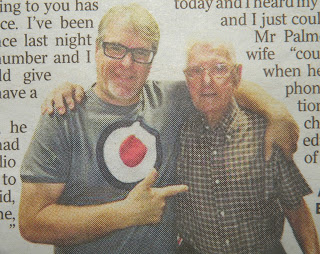 |
| Ninety-five-year-old Bill Palmer pictured with DJ Alex Dyke in The Times newspaper this week. |
When 95-year-old Bill Palmer married his wife, Sheila, last year after 30 years of friendship, life seemed perfect. Little did he know that his desperate loneliness would soon make him an internet sensation.
The plucky pensioner hadn't reckoned on the power of his own voice when he joined a phone-in on BBC Radio Solent when he had 'no-one else to talk to.'
Bill, it seems, has been been living alone in their bungalow since Sheila, 85, had a bad fall. She was taken to hospital and then then on to a nursing home, suffering from dementia. 'Every day is hell, he confessed to disc jockey Alex Dyke. ' She's just so happy when I see her.... (but) oh, I feel so alone.'
How did the disc jockey react? He sent a BBC car to pick up Mr Palmer and take him to the station for a cup of tea and a piece of cake. The emotional moment, captured on the radio station's facebook page, has been viewed almost 200,000 times.
Dyke, who was sadly too busy to see Bill when he visited the station last year said it was his 'nicest moment in 30 years of broadcasting.'
Meanwhile Bill has been inundated with offers of companionship, from Sunday lunch to a private concert by a ukulele orchestra - and a message from someone in North Carolina. When his wife found out what had happened she told him. 'We're the talk of the nation.'
I like to think this feel-good story is one with a mission, proving it wasn't always better in 'the good old days.' Local radio is the unsung hero of the airwaves these days keeping whole communities in touch with each other and, as a result, looking after their wellbeing. Only last year I was fortunate enough to be interviewed on BBC Radio Lancashire when DJ John Gillmore organised a 24 - hour interview marathon to raise money for Children in Need.
These acts of kindness are actually going on all day every day all over Britain. So don't forget to support your local radio station. You might even be saving someone's life.














